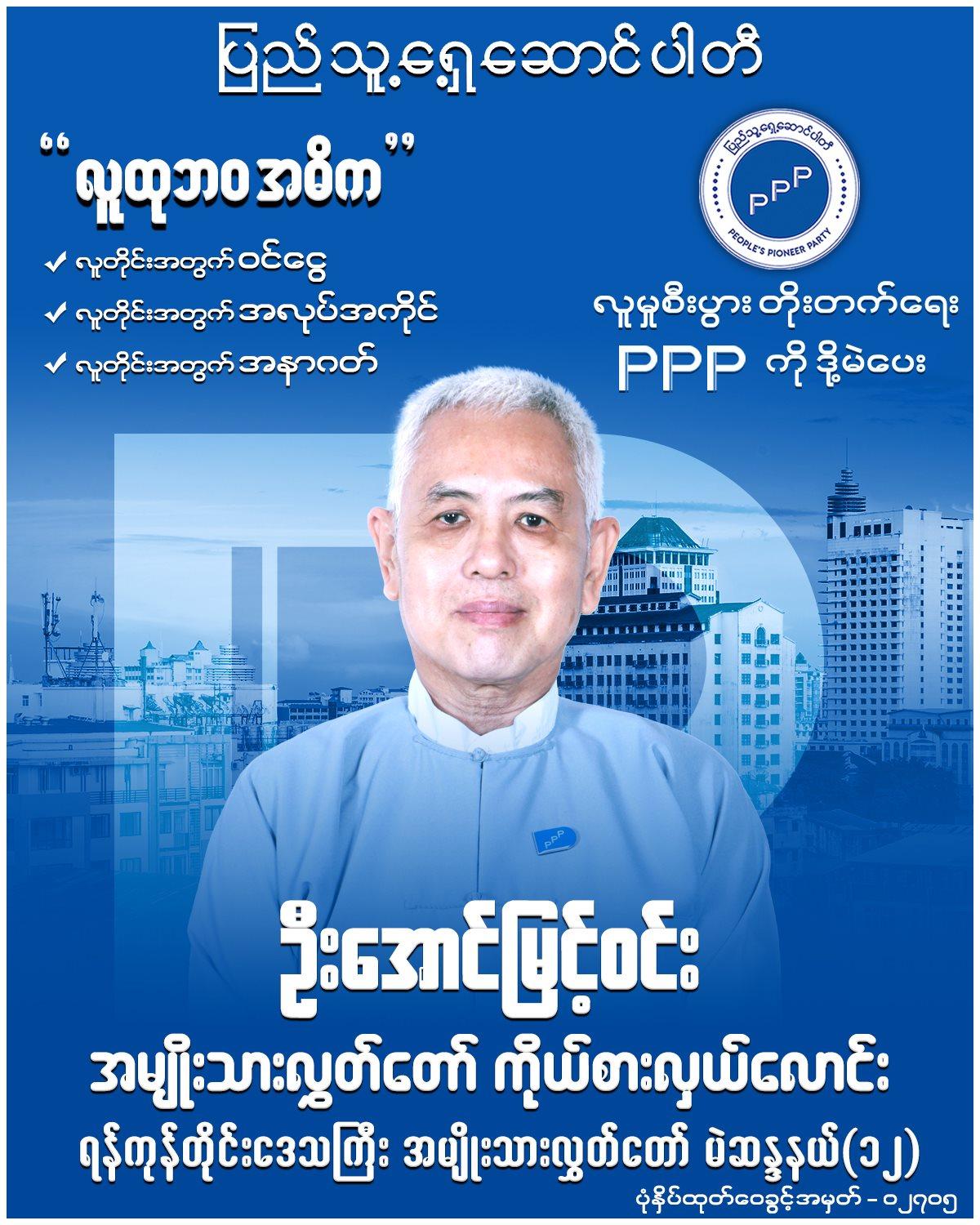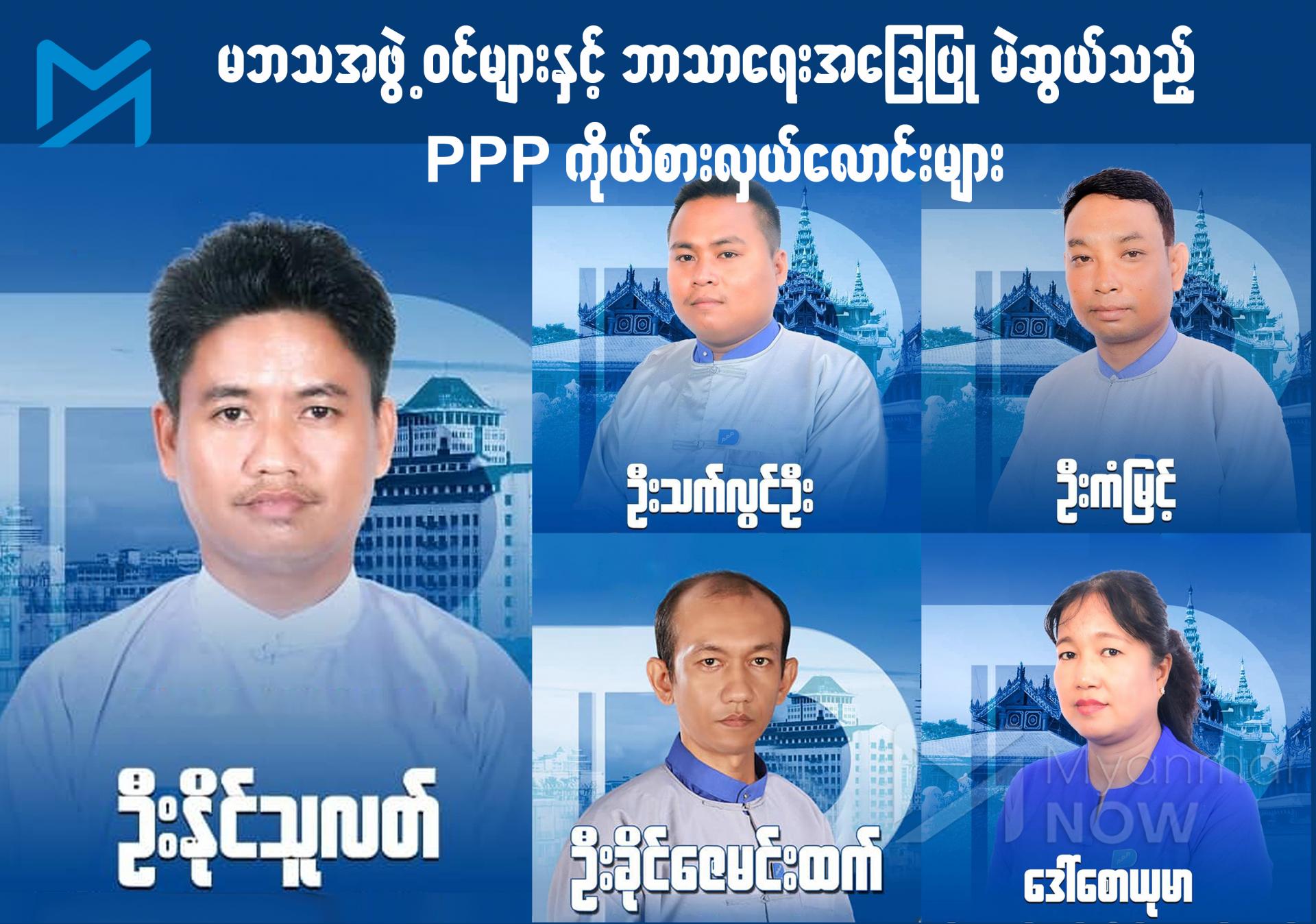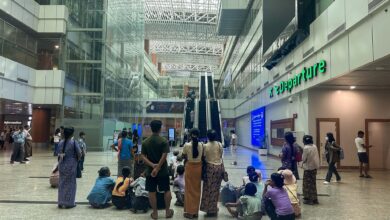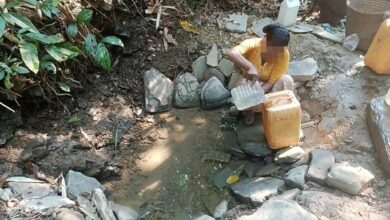
The People’s Pioneer Party (PPP) is not going to let the fact that it is just a year old stand in the way of its big ambitions. With 234 candidates running in the upcoming election, it says “the entire party is playing to win.” Part of this confidence no doubt stems from the backgrounds of its founding members, who in the past belonged to two of the country’s political powerhouses: the military and the ruling National League for Democracy (NLD).
Founded by Thet Thet Khine, a successful businesswoman who left the NLD after being suspended for criticizing its leader Aung San Suu Kyi, the PPP has two retired military officials serving as vice-chairs. Kyaw Zeya (who also parted ways with the NLD) and Myint Maung Tun both had long careers in the Tatmadaw before entering the political arena, and also have ties to the business world.
As a party with a fairly clear agenda—its focus is on prioritizing socioeconomic development—the PPP is hoping that its message will resonate strongly enough with voters to make up for its lack of name recognition. But at the same time, it also has to find common ground among its own members, who include a significant contingent of ultranationalists.
Myanmar Now has looked into the composition of the PPP to get a better idea of where the party might stand on the issues.

Retired military officers
At least 16 PPP candidates are former military men.
Kyaw Zeya, who currently sits in the Yangon regional parliament as the representative for Dagon township’s constituency 2, is a retired lieutenant colonel who served in the military for 38 years. He also spent 10 years as a director on the board of Myanmar Economic Holdings Limited (MEHL), a military-run conglomerate.
The 64-year-old Kyaw Zeya left the NLD last year and is now a vice-chair of the PPP. He is running as the party’s candidate for Amyotha Hluttaw constituency 11, which includes the townships of Kyauktada, Sanchaung, Dagon, Pabedan, Bahan, Mayangon and Latha.
The PPP’s other vice-chair is Myint Maung Tun, a 71-year-old retired major who is currently an entrepreneur. He is contesting in the Kamaryut township constituency for a seat in the Pyithu Hluttaw.
His candidacy announcement stated that he served in the military from 1971 until 1991, and as a general manager and director at the No.2 Heavy Industries Enterprise from 1991 to 2010. He also served as chair of the Myanmar Finance Cooperative Federation from 2008 to 2016.
Since retiring from the military, Myint Maung Tun has dedicated most of his time to various commercial enterprises. Currently he is working in the businesses of generating and selling electricity, power plant construction, microfinance and telecommunications services.
His name does not appear on the board of directors at Asia Business Synergy or Star Link, which are listed in the candidacy announcement as companies that he founded.
“The military wants to redeem its reputation so they’re doing a lot of reform and trying to be a standard army,” said PPP vice-chair Myint Maung Tun
According to the Directorate of Investment and Company Administration (DICA), Myint Maung Tun is a member on the board of directors at Malikha Engineering Ltd and Myanmar Business Resources Co., Ltd.
He is also a board member at Myanmar Telecommunication Network Public Co., Ltd., which provides maintenance services for telephone lines in the townships of Mayangon, Mingaladon and Htauk Kyant, where many military personnel live.
The company also operates satellite communications and an international gateway (IGW) service, and has set up a digital village. It is also reportedly planning to install an underground cable line along the Yangon-Mawlamyine-Dawei railway line.
According to Myint Maung Tun, some of the profits from these businesses are used for social welfare activities. He added that he became interested in politics mainly because he saw it as a way to work for the benefit of the people.
As a former member of the military, he told Myanmar Now that he understood the military’s involvement in certain regions where conflict presented a danger to the country.
He said the current military figures are not the same as those who ruled in the past. He added that he is in constant communication with the new generation of military leaders and wants to cooperate with them because he understands their desire for reform.
“The military wants to redeem its reputation so they’re doing a lot of reform and trying to be a standard army. When I talk to them, I can see their true beliefs. In any case, we understand the military,” he said.
Besides Kyaw Zeya and Myint Maung Tun, other PPP candidates with a military background include former Lt-Col Aung Myint Win, former captains Zaw Myo Thet and Myat Thu Linn, and Ye Aung Kyaw.

According to the party’s candidacy announcement, Aung Myint Win served as a special officer and operations manager at Naing Group and Max Myanmar from 2004 until 2018.
The announcement said he was involved in construction businesses in Ayeyarwady, Sagaing and Yangon regions, real estate and the construction of a telecommunications tower from 2009 to 2016.
He also served as chief executive officer at the Yangon Veterans Supervision Board from 2016 until 2019.
Aung Myint Win is contesting in Amyotha Hluttaw constituency 12, which includes the townships of Kamaryut, Kyimyindine, Lanmadaw, Hlaing and Ahlone.
Other retired military officials with business expertise who are representing PPP in the election include Myat Thu Lin from the townships of Nga Pu Taw and Pathein in Ayeyarwady region, Zaw Myo Thet from Karen state and Ye Aung Kyaw from Kamaryut township in Yangon.
The exact number of PPP candidates who are former military personnel is unknown, but party vice-chair Kyaw Zeya said he was aware of more than five candidates with military backgrounds in Yangon.
He added, however, that these candidates were chosen on the basis of their suitability for public office, and not simply because they had served in the military.
“We can’t pick a candidate just because they’re a retired captain,” he told Myanmar Now.
According to the party’s manifesto, four of its 64 objectives deal with communication between the military and civilians and come under the heading of “national reconciliation”.
The manifesto also states that provisions in the 2008 constitution related to the military’s involvement in politics have led to the deterioration of relations between the military and civilians. National reconciliation remains a distant goal, it says.
The chair of the party, Thet Thet Khine, was quoted by AFP in September as saying that while the military made mistakes in the past, the new generation of military personnel understands professionalism.
Ultranationalists
According to party chair Thet Thet Khine, the PPP has five major criteria for selecting a candidate: the person has to be a member of the party; be well-known and trusted by the people; be experienced; be able to attend trainings provided by the party; and be able to understand legislation, the government, the law, and how to represent the people.
Despite this, however, at least 10 members of the controversial Patriotic Association of Myanmar (better known as Ma Ba Tha) are included on the list of PPP candidates.
“I completely understand the civilian and military relationship. You can’t amend the 2008 constitution without the military’s involvement,” said former Ma Ba Tha member Kan Myint
Ma Ba Tha, a monk-led association notorious for its religious nationalism, was dissolved under the current government after it was declared an unlawful association.
PPP candidates include former Ma Ba Tha members Kan Myint, Khaing Zay Min Htet, Saw Yu mar and Thet Lwin Oo.

Kan Myint, a candidate contesting in Bago’s Thae Kone township constituency 2, was a recruitment officer for Ma Ba Tha in Bago region. He told Myanmar Now he has led Ma Ba Tha meetings and events supporting the military in Bago.
At least 10 nationalist candidates who were involved in Ma Ba Tha, including Naing Thu Lat and Khaing Zay Min Htet, are representing PPP in this year’s election, he said.
He said he joined the party because of its plan to achieve national reconciliation. He added that he would focus on farmers’ affairs if elected.
“I completely understand the civilian and military relationship. You can’t amend the 2008 constitution without the military’s involvement. PPP isn’t a party that’s relying on any individual. It was formed with a collective effort that everyone can contribute to,” he said.
Saw Yu Mar and Thet Lwin Oo, who are running to represent Thae Kone township in the Pyithu Hluttaw and regional parliament, respectively, have broken election rules against using religion for campaigning purposes, and on social media shared a post that put the PPP flag together with the flag of Myanmar and the Buddhist flag.
Saw Yu Mar, 46, has shared social media posts that contain vulgar language attacking other religions. In one, posted on September 12, she referred to Muslim candidates by the racist term “kalar” and warned the public that their children could end up becoming their mistresses.
She later denied sharing the post, claiming that two people manage her account.
She told Myanmar Now that she is “just a nationalist activist,” not someone who attacks people of other religions or ethnicities. But she stood by the post with the three flags, saying that it reflected her belief that religion and politics are closely connected.
Naing Thu Lat, a former Ma Ba Tha member, is contesting in Yangon’s Insein constituency as a PPP candidate. In 2015, he ran as a candidate for the National Development Party (NDP), founded by former Thein Sein advisor Nay Zin Latt. The NDP ran afoul of election officials for bringing religion into its campaign activities.
In 2018, Naing Thu Lat joined a nationalist crowd in attempting to incite police to arrest anti-war protesters. He was fined 5,000 kyat by the Bahan township court for breach of duty.
Despite the extreme nationalism and religious chauvinism of some of its members, the PPP also has one Muslim candidate.
Aung Myo Min is a Pyithu Hluttaw candidate contesting in Yangon’s Mingalar Taung Nyunt township. According to vice-chair Kyaw Zeya, the party didn’t realize the 39-year-old businessman was a Muslim when it selected him as a PPP candidate.
“He looked just like a Bamar and we didn’t ask him about his religion. He didn’t say anything about it, either. Our application form doesn’t discriminate on the basis of religion or ethnicity. After the candidates were officially announced, we asked him and he said he is a Muslim. There’s nothing we can do about it now,” he said.
There have been other Muslims who applied to become candidates, but they were rejected because the party didn’t want to be seen as actively supporting members of a religion that is regarded with mistrust by many Myanmar Buddhists.
“Actually, we want to accept their applications but we had to apologize and tell them to just join as members because the party is just starting out,” said Kyaw Zeya.
Former NLD members
There are a number of PPP candidates who previously ran as members of other parties, including the Union Solidarity and Development Party (USDP) and the New Democracy Party (NDP). But no party has contributed more to the formation of the PPP than the NLD.
Both its chair, Thet Thet Khine, and one of its vice-chairs, Kyaw Zeya, were NLD members until last year. And they are not alone.
Another former NLD member running as a PPP candidate is Phay Chit, an incumbent Amyotha Hluttaw representative who is contesting this year in the Hmawbi constituency for a seat in the Pyithu Hluttaw. He is also a former military officer.

Aung Myo Khaing, the son of NLD co-founder Aung Gyi, is also a PPP candidate in the upcoming election. The 48-year-old co-founder of the Shwe La Min teashop and the Kumudra special clinic is hoping that his decision to leave the NLD won’t backfire on him the way it did for his father 30 years ago.
Maj-Gen Aung Gyi, who served as deputy commander-in-chief of the armed forces during the Ne Win era, became the NLD’s first chairperson when the party was founded in 1988. He resigned about three months later, however, and went on to form a party that performed poorly in the 1990 election.
There are two former USDP members running as PPP candidates: Aung Kyaw Htay, who is running to represent Nyaung Lay Pin township in the Bago region parliament, and Thiha Soe, who is contesting in Mayangon township for a seat in the Yangon region parliament.
Hnin Pwint, a candidate contesting in Yangon’s Yankin constituency for a seat in the Pyithu Hluttaw, is a former member of the NDP. Her candidacy announcement stated that she has written stories and scripts for the military-run Myawaddy TV.



